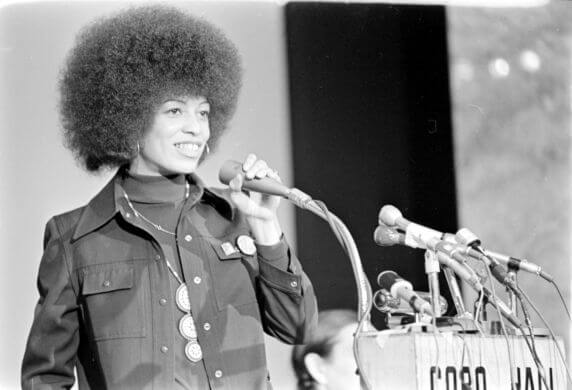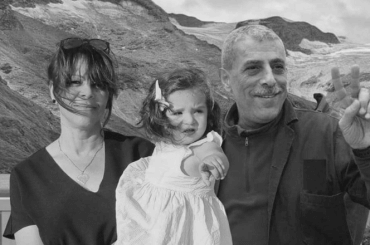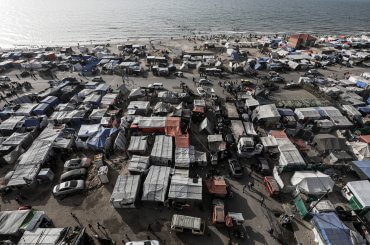On Tuesday across the occupied Palestinian territory demonstrators marked Prisoners Day, an annual call to free over 6,000 Palestinians imprisoned by Israel. The commemoration first began on April 17, 1979, five years to the day after the first prisoner exchange between Israel and the Palestinians. The day has since spread to honor former prisoners, including Ahmad Saadat, Georges Abdallah, and Rasmeh Odeh, who was initially sentenced to 18 months in a U.S. prison in 2015 before her appeal.
The conviction rate of Palestinians in Israeli court cases in the West Bank is virtually 100 percent, with only 33 percent of appeals by defendants accepted. As of February 2018 roughly 6,500 Palestinians are detained in Israeli prisons, with almost 2,000 of those being imprisoned in 2018 of alone, reports The Palestinian Prisoners Society. Included in this is the incarceration of Palestinian children, which in 2017 reached over 400.
“Ninety-five percent of imprisoned children have been subjected to brutality during their arrest and interrogation,” said Issa Qaraqe, the director of the Commission for Detainees and Ex-Detainees Affairs, to the Middle East Monitor last year. “The occupation government has adopted a systematic policy of detaining children, torturing them and placing them in inhumane conditions.”
Across social media, one name has rang loudly as an international face for the movement to free Palestinian political prisoners: Ahed Tamimi.
Tamimi, the young activist who recently spent her 17th birthday in an Israeli prison, was incarcerated in December of 2017 and has since inspired a series of protests and demonstrations both in Palestine and around the world.
Video footage was recently leaked showing Israeli interrogators attempting to use wildly inappropriate conduct to coerce a confession from Tamimi, with Ahed’s lawyer filing a complaint of “inappropriate conduct” including sexual harassment. While Ahed’s father was able to obtain only two hours of footage, “during the first 10 days of her detainment, Ahed was continuously interrogated, sometimes for 12 hours at a time,” reported Yumna Patel and Akram Al-Wa’ra.

Palestine specially resonates with Black political prisoners
What remains clear is that political prisoners, who exist simultaneously as victims of oppression and heroes against it, resonates internationally, and are yet another key linkage between the movement for Palestinians and others. It is no coincidence, then, that many of the biggest non-Palestinian voices of solidarity are themselves former political prisoners, as well as prison abolitionists.
Former Black Panther Mumia Abu-Jamal, arguably one of the most well-known political prisoners in the world, has repeatedly stressed the importance of the Palestinian struggle. In 2013, as part of Mumia’s Prison Radio recordings, he referred to the state of occupied Palestine as “open-air prison ghettoes,” a statement which has been iterated by multiple intellectuals, activists, and writers who have referred to Palestine as the world’s “largest open-air prison.”
Mumia oft-refers to Palestinian life under an occupied “stateless state,” as a kind of living carcerality, or the condition of incarceration becoming socially and spatially normalized where the “incarcerated” are no longer necessarily behind bars, but daily incarcerated by conditions. In the same 2013 Prison Radio dispatch Mumia described, “Welcome to the Israeli occupation, blessed by the U.S. government as its Imperial outpost,” adding, “Where the lives of Palestinians are broken into thousands of pieces daily, where everything, from olive trees to water sources, everything but the Sun itself, is locked up, barred, caged from the people of Palestine.”
Along with Mumia is former political prisoners and South African anti-Apartheid activists Winnie Mandela-Madikizela and Nelson Mandela, who while alive, both gave unwavering support and solidarity to the Palestinian people. Winnie recently passed at age 81. She spent 491 days incarcerated in solitary confinement in 1969 and was known to be a “staunch supporter” of the BDS movement, according to broadcast journalist Adama Manu. Winnie often met with and supported local Palestinian solidarity groups in South Africa, and in 2004 stated “Apartheid Israel can be defeated, just as apartheid in South Africa was defeated.”
The creation of the “political prisoner” has always been a double-sided sword to the oppressor who relies on the “imprisonment of militants” and “subversion of political leader,” as Mumia Abu-Jamal put it in the recording, to dampen movements, but inevitably and unexpectedly create another movement in the process. By incarcerating the faces of a movement, or any form of unjust incarceration which can be transformed into a rallying cry for justice, the oppressor, in this case Israel, allows for the symbolism, struggles, and voice of the incarcerated to be amplified. And this amplification of the voices of the unjustly incarcerated may be one of the deepest resonating voices worldwide.
“Former political prison Angela Davis wrote a message to the world while behind bars in Marin County Jail in a 1971 letter,”
“The political prisoner’s words or deeds have in one form or another embodied political protests against the established order and have consequently brought him into acute conflict with the state. In light of the political content of his act, the “crime” (which may or may not have been committed) assumes a minor importance.
…
In all instances, however, the political prisoner has violated the unwritten law which prohibits disturbances and upheavals in the status quo of exploitation and racism.”
Although in the U.S., as Davis mentioned, political prisoners are not formally, legally recognized as prisoners for such, their incarceration is anything but apolitical. From this arises the notion that in a system of white supremacist capitalism and colonialism, all colonized people who are incarcerated can be seen as political prisoners, having been convicted and/or detained in a system which is foundationally, politically immoral. For Palestinians, the legitimacy of the Israeli court system, including its apparatus of policing and surveillance, rests on their own demise. Similarly, the legitimacy of the court system in the U.S. rests on the demise and exploitation of Black and Indigenous peoples. That is to say, an illegally and violently founded settler court system will always be in opposition to the colonized body, and thus political prisoners will always be in existence so long as the court system does.
If Palestine is the world’s largest open-air prison, as Mumia Abu-Jamal, Noam Chomsky, and many others have described it, and as Davis illustrates, all incarcerated Palestinians in Israeli prisons may be seen as political prisoners, then Palestinian life under occupation may be understood as a constant state of carcerality. In the U.S., where we face a mass incarceration system and occupying, militarized police force which engages in mass injustice against Black people, Blackness may also be seen as a constant being of carcerality, at least at every points where it intersects with the state. Thus, the connection is forged between the Palestinian and Black political prisoners, who become the embodiment of this unjust and illegitimate incarceration.
Palestinian Prisoner Day reminds us that it is often the incarcerated, the political prisoners who become the ultimate international rallying cry for justice. Among all movements of oppressed people, but particularly those of Black and Palestinian people, political prisoners become the face and embodiment of this unjust carcerality, recognizable figures from Angela Davis’ afro to Ahed Tamimi’s smile. We hold closely to these figures, and to the incarcerated, not because they are necessarily lionized but because they represent an integral key in breeding international, intercommunal solidarity.



Devyn,
Thank you for sharing this thoughtful article. The world needs to know about these facts.
The court of world public opinion is far more important, far more meaningful than any “Israeli” kangaroo court.